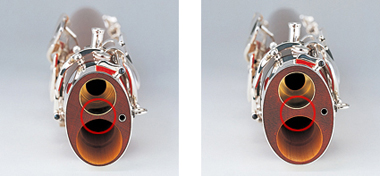Choosing a Bassoon
Selecting Wall Thickness
The sound varies depending on the thickness of the wood that surrounds the bore
A bassoon with walls of regular thickness has a rich sound, with a high degree of flexibility that can easily produce sound with a soloistic, song-like and expressive quality. More power is required when playing a bassoon made with heavy, thick walls, but its sound has a uniquely solemn, dark quality, and is particularly suited to orchestral performances.

Standard wall thickness YFG-811 (left), and thick wall YFG-812 (right)
Musical Instrument Guide : Bassoon Contents
Structure
- What Kind of Musical Instrument is a Bassoon?
- A Long Tube that can be Separated
- The Bocal and its Various Functions
- Unique Features of the bassoon, and How to Play
- [Experiment1]Comparing the Sound of Tone Holes cut Obliquely and Perpendicular
- [Experiment2]Encasing the Bore in Various Materials
- Bonus Experiment
How to Play
How the Instrument is Made
Choosing an Instrument
Trivia
- An Instrument that is Sensitive to Humidity
- Sounds from water in the U-tube?
- There's a needle in the bocal?!
- Comments by conductors caused popularity to tumble?
- Bassoon classics - Chamber music works
- Bassoon classics - Concertos
- Is the "contra-fagotto" a contrabassoon?
- What is the best tool to file a reed?
